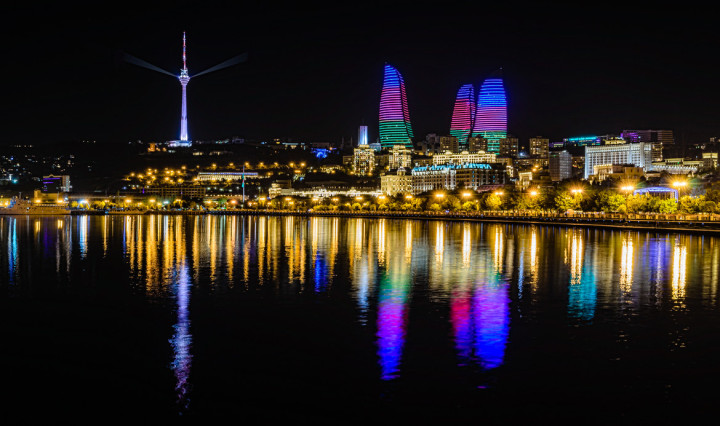Not even the extravagance of Ilham Aliev’s government on the European Olympics in June 2015 – which included the payment of transport costs and a breakfast of Azeri kuku for the 6000 athletes during the games – could change the decision of European leaders to boycott the opening ceremony in protest, supposedly, because of the persecution of dissidents. Are they also thinking about punishing the Saudi sheikhs for banning political parties, trade unions, a free press or for decapitating women and men in public squares? Or the Emirs of the mediaeval Qatari regime for exploiting to death almost 1200 immigrant-slaves working on construction projects for the 2022 world cup?
The real reason is something else: the change in Baku’s foreign policy led by Ilham Aliyev, son of Heydar Aliyev (1993 – 2013) – the former US-aligned president – who keeping the same political system of “market and repression” has opted to relax tensions with Russia instead of being a NATO military base in the South Caucasus in exchange for nothing.
Only two years ago, Azerbaijan (which means “Land of Fire” in Persian) welcomed the USA-Azerbaijan: Vision of the Future meeting with the presence of dozens of politicians and businessmen such as vice-president Joe Biden, Paul Wolfowitz, one of the butchers of the Iraqi and Afghan people, and representatives of a dozen or so oil companies such as BP, Chevron and ConocoPhillips. They went to consolidate US-EU domination over the hydrocarbons and the Caucasus enclave at the very gates of Moscow.
Russia defends its border territory
Nevertheless, the geopolitical dynamics of the region have changed, stealthily: Putin’s doctrine which includes recovery of Moscow’s influence in the former soviet space, is advancing relentlessly and has accomplished:
– the prevention of the USA and the EU from building the Nabucco pipeline
– Frustration of the GUAM Project, a military Alliance between Georgia, Ukraine, Azerbaijan and Moldova, a NATO subsidiary in the zone.
– That the quintet of countries surrounding the Caspian Sea said “no” to US presence unanimously.
– That Azerbaijan abandoned naval cooperation projects with the USA in the Caspian Sea (KASFOR). This initiative was proposed by Russia when Moscow was cooperating with NATO, and raised so much suspicion that Iran also rejected it. Now that Vladimir Putin is reactivating the project as an initiative unlinked to the USA, Baku and Teheran can show interest.
– the closing of the North route for sending NATO military equipment to Afghanistan, as a reprisal for the provocations by the Alliance in Ukraine, leaving thousands of soldiers to fend for themselves against Pakistan and the Taliban.
Moreover, Russia has the following assets:
– a rapid response force unfolding on the Caspian Sea coast.
– Influence in the Nagorno-Karabakh enclave and troops in the Gyumri base, Armenia, a country of great strategic value. Requests by the USA-EU to Ankara to approach Yerevan and recognise the Armenian Genocide (in order to thereby remove the country from Russia’s influence), were frustrated and added insult to injury by increasing Baku’s mistrust towards the west.
– Cooperation by Giorgi Margvelashvili, the new Georgian Prime Minister, who in 2013 dislodged the pro-Nato Mikheil Saakashvili from power. US refusal to support them militarily in the war with Russia in 2008 was a big lesson.
– The possibility to block Azerbaijan pipelines in any moment. Also Georgian ones.
– Increase the standing of Turkmenistan (the world’s fourth largest gas reserve) in the region, to the detriment of Azerbaijan.
– Build a pipeline with Turkey, the Turkish Stream, destined for Europe that will compete with the Trans-Anatolia Gas Pipeline project, sponsored by the USA, the EU and Azerbaijan.
– Expand the stationing of anti-missile radars that it possesses since the Soviet Era in the Azeri city of Qabala.
A solid front composed of Russia, Iran and Armenia is watching with satisfaction and concern the disintegration of the USA-Israel-Azerbaijan-Turkey axis.
A Jihad and Maidan for Azerbaijan
Richard Morningstar, US Ambassador to Baku, has threatened Aliev with his own “Maidan Square” as a result of his policies. What he hasn’t revealed is if in Azerbaijan there will also be a “colour revolution” or a coup d’état. Morningstar, sent by Barack Obama to the zone to distance Russia from the energetic projects in the Caspian region, promoted the Southern Gas Corridor (Azerbaijan-Turkey-Greece) and after burying plans for the Nabucco gas-pipeline, it was proposed to take gas from the Shah Deniz fields, among the world’s largest, to Greece, Albania and Italy, as long as Russia keeps its fingers out.
To promote another conflict with Armenia; an ethnic-religious conflict (such as, for example, to support the separatism of the Talysh people, a 300,000 strong community of Iranian origin); to fill the press with cases of torture, to use political prisoners or the tragedy of a million refugees from the Armenian War; “fight against terrorism” and convert the Jihadists that, after unfathomable support of the Saudis, are appearing in this Muslim state into the excuse so that the USA and the EU prepare another plan to change the status quo in the region. For Barack Obama in his first mandate, an anti-China alliance with Moscow was more important than overpowering the complicated former Soviet republics. Now the intrepid President is fighting against both, and after his great anti-Russia offensive from Ukraine, he has opened another front of the conflict in the Caucasus.
In Azerbaijan, jihadists from the Jamaat (Community) Group are already operating, connected with Chechen Islamists, the Caucasus Emirate, and with Syria’s Islamic State: the attack on Eurovision in 2012 and the murder of several Shiite clerics carry their hallmarks.
The response by Georgia’s Margvelashvili to US and EU interference has been to close the office of Radio Free Europe, to deny visas to several European media staff and also George Soros’s Open Society Foundation.
Day after day, and in the midst of a bloody war for gas, the USA has ended up without any points of support in Eurasia.










